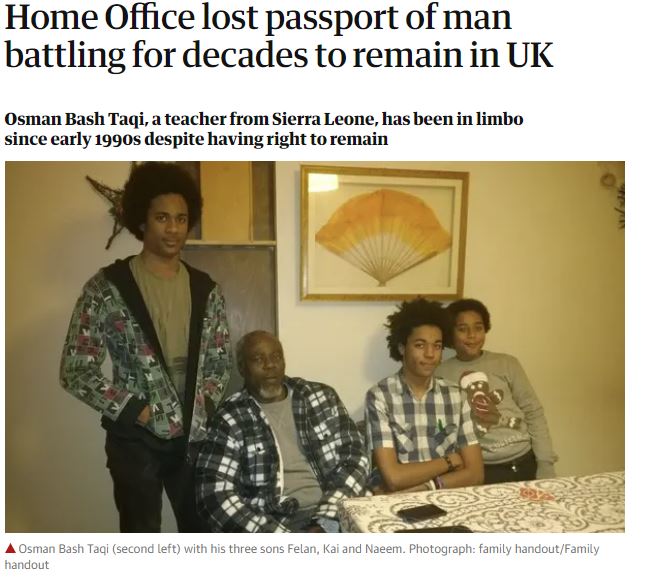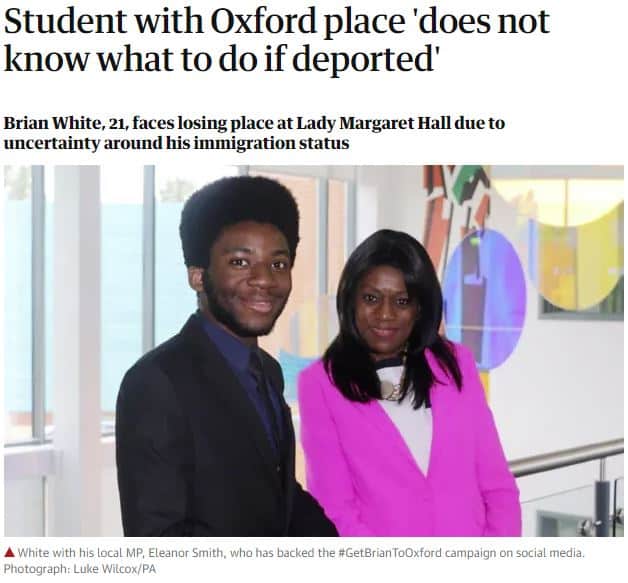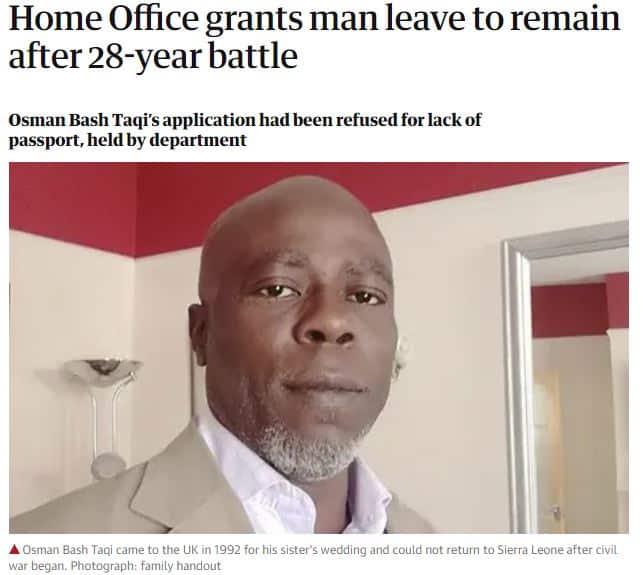On 14 May 2020 I got my client’s story into a feature piece in The Guardian. Since 1992, the Home Office had refused to recognise my client as having lawful residence in the UK, so we felt there was little to lose. Just five days later, on 19 May 2020, and as reported in this follow-up Guardian piece, I was notified that my client had been granted indefinite leave to remain.
It was moving, listening to my client’s joy and emotional outpouring as I told him the news. This decision followed a remarkably similar pattern to what happened in a different previous case of mine, a few years back. In that case, my client, Brian White, featured in the Guardian and received other significant media attention, and, lo and behold! within a week was granted of indefinite leave to remain.
These cases, particularly when seen alongside the peculiar twitter outbursts by the Home Office ‘correcting’ statements around immigration made by individuals and NGOs, points to a department obsessed by PR and but less bothered about making fair decisions.
Ossie’s case
I first met my client Osman Bash Taqi, ‘Ossie’, in December 2018. A former teacher from Sierra Leone, he told me about his three Italian children and his 20-year relationship with an Italian woman, and mother of his three children, which had recently broken down.
Ossie made an immediate impression which has stood the test of time. He is intelligent, thoughtful, and good company. But, initially, I was also suspicious; he must be hiding something sinister to cause him to be cast into the wilderness which having no lawful status entails. Yet despite my efforts to play Line of Duty detective, there was nothing whatsoever to ‘unmask’. It soon became clear that Ossie had been the victim of a catalogue of Home Office actions and policies which were cruel and often absurd.
Ossie had arrived to attend his sister’s wedding but had been unable to return home, due to the horrific civil war which had broken out in Sierra Leone and would last 11 years. Ossie did claim asylum but, for reasons which remain unclear, his asylum claim was not processed. Through the years he missed out on several blanket policies granting Sierra Leoneans indefinite leave to remain.
Around 2008-2010, Ossie again missed out, this time on something akin to an unofficial amnesty, as the Home Office began granting indefinite leave to huge numbers of asylum seekers who had claimed around 2004 and earlier, including those without any family members in the UK.
In 2010 Ossie tried to marry his long-term Italian partner: marrying his partner would have given him an automatic right to reside in the UK under EU law, and as EU law has ‘direct effect’ he would no longer need ‘paper work’ from the Home Office to prove this. But at that time, Ossie needed Home Office ‘permission’ to marry (a policy which would subsequently be struck down as unlawful).
Ossie was told he needed his passport to request permission to marry, but he did not have his passport as the Home Office had not returned it to him. Furthermore, the Sierra Leone embassy in London was no longer issuing replacement passports unless you had already been issued the ‘new’ biometric type, which Ossie did not have.
In 2013, the Home Office reviewed Ossie’s case and, despite his three EU citizen children and EU citizen partner, decided Ossie had no legal basis to stay in the UK.
In 2015 Ossie applied for a residence card based on his long-term relationship to his EU citizen partner, with whom he had three children. Things then went full on Kafka-mode when the Home Office refused the application. Ossie’s relationship was apparently not durable, all because he could not provide utility bills in his name (utility companies do not allow irregular migrants to open accounts, something the Home Office will know) and the Home Office rejected the extensive alternative evidence, such as countless letters from his children’s schools addressed to him, medical letters at his address and the like.
As Ossie had not provided a passport with the application, he was then denied the right of appeal and the chance to have his case heard before a judge. A judge would later find that the Home Office had possession of his passport, and a subject access request revealed a copy of it on his file. Sadly, under this pressure Ossie’s 20-year relationship with his partner eventually broke down. It is worth noting that without lawful status, you cannot work, you cannot claim public funds nor use the NHS, you cannot open a bank account, you cannot travel. These measures effectively make your daily life nearly unbearable. Ossie became obsessed with the injustice of his situation, and at times felt like he was losing his mind.
When Ossie connected with me, he was willing to give it one final shot. I thought Ossie had a clear-cut case for indefinite leave to remain, under the new, Brexit-inspired EU Settlement Scheme, based on his EU citizen children. After several false starts at applying due to him… not having a passport, a mandatory requirement under the Scheme, we eventually persuaded the Home Office to allow us to apply without a passport in, June 2018.
Brian White
I had been considering approaching the media about Ossie’s case for a while, following the success another former client of mine had with this method. Brian White had actually approached the media of his own accord and his case was published in the Guardian. I remember expressing doubts as to whether this approach would backfire, concerns which turned out to be wholly unfounded. An A* student with an offer of a place at Oxford University at stake depending on whether he would be granted status, and with the Home Office having messed up the decision on an earlier application, Brian’s case attracted widespread sympathy, culminating with him sitting on opposite ends of the sofa with Eamon Holmes, on ITV’s This Morning.
Within days of going to the media, I received a phone call from a senior Home Office official confirming they wanted to grant him indefinite leave to remain.
Going to the Guardian with Ossie
Back to Ossie – with the one-year anniversary fast approaching since we had submitted Ossie’s latest application, Ossie decided to go for it. I got in touch with Diane Taylor from The Guardian who was shocked by the case and keen to write about it.
On 14 May 2020, Diane published this article. Five days later, on 19 May, a mail popped into my inbox from the Home Office, confirming the news that Ossie had waited so long for, that he had been granted indefinite leave to remain (Diane pointedly notes that Ossie’s wait spanned six governments, starting with John Major. The use of historical reference points is helpful to bring the extent of the delay into focus. Another random reference point is that, The Shamen’s Ebaneezer Goode was number 1 in the charts, when Ossie’s wait began!).
What is this all about?
You might think I should just be happy that I have had help from the media, where my usual forms of legal redress have failed. But there is still a nagging feeling that, this cannot be a good situation. As I said in the second Guardian piece following Ossie’s being granted status, ‘“It shouldn’t take 28 years and an article in the Guardian to bring about justice for Ossie”’. Likewise, it should not have taken a media outcry to ensure Brian White’s injustice was corrected so that he could be a bright young student studying Chemistry at Oxford.
It cannot be claimed that the Guardian article first brought this to the attention of the Home Office. It was fully aware of Ossie’s situation, through the multiple applications, and Ossie had even enlisted the support of his local MP.
It seems to me that the Home Office will show a callous side when simply dealing with the likes of migrants themselves, or with their battle-weary legal representatives (and as a profession we perhaps wrongly assume the public cares less than it does). Yet the Home Office seems to care a lot about being seen in a bad light.
On a separate but related note, the Home Office has recently been involved in multiple ‘twitter spats’ with individuals or NGOs it feels has misrepresented them, or, their policies. It reprimanded the Joint Council for the Welfare of Immigrants (JCWI) for the JCWI’s interpretation of how a High Court hearing went earlier in the day, regarding a legal challenge to the Right to Rent scheme.
The Home Office’s twitter police were again quick off the mark to challenge The Secret Barrister, who had made a quite correct observation that the Home Secretary had sought to unduly influence the President of the First-tier Tribunal, by trying to pressurise the tribunal into releasing fewer detainees in light of the pandemic. The Secret Barrister is just some bloke or woman, presumably a barrister, knocking out a few comments most days. Why are the Home Office bothering with the likes of them?
We cannot expect perfection from the Home Office, and I understand that it deals with a lot of cases. But it needs a radical shift in focus, away from trying to be liked, to doing its core work, of making lawful and fair decisions.
Truth Legal
If you need guidance on an indefinite leave to remain application, Truth Legal can help.
Further Reading
From one of the UK’s most read legal blogs.













